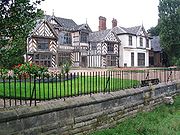
Robert Henry Grenville Tatton
Encyclopedia

High Sheriff
A high sheriff is, or was, a law enforcement officer in the United Kingdom, Canada and the United States.In England and Wales, the office is unpaid and partly ceremonial, appointed by the Crown through a warrant from the Privy Council. In Cornwall, the High Sheriff is appointed by the Duke of...
of Chester
Chester
Chester is a city in Cheshire, England. Lying on the River Dee, close to the border with Wales, it is home to 77,040 inhabitants, and is the largest and most populous settlement of the wider unitary authority area of Cheshire West and Chester, which had a population of 328,100 according to the...
from 1936 until 1937. He was the last member of his family to own Wythenshawe Hall
Wythenshawe Hall
Wythenshawe Hall is a 16th-century medieval timber-framed historic house and former stately home in Wythenshawe, Manchester, England. It is east of Altrincham and south of Stretford, five miles south of Manchester city centre, in Wythenshawe Park.-History:The half-timbered Tudor house was the home...
and its estate, the ancestral home of the Tattons for 600 years, and the last male member of his line.
After selling his Wythenshawe estate to Manchester Corporation
Manchester City Council
Manchester City Council is the local government authority for Manchester, a city and metropolitan borough in Greater Manchester, England. It is composed of 96 councillors, three for each of the 32 electoral wards of Manchester. Currently the council is controlled by the Labour Party and is led by...
in 1926 Robert and his family moved first to Wybunbury
Wybunbury
Wybunbury is a village and civil parish in the unitary authority of Cheshire East and the ceremonial county of Cheshire, England. The village lies 3¼ miles to the south east of Nantwich and 3¾ miles to the south of Crewe. The parish also includes the settlements of Clannor Heath, Daisy Hill, The...
in Cheshire and then to Kent, where Robert died the day before his 79th birthday.
Early life
Robert was the only son of Thomas Egerton Tatton and his wife Essex Mary Cholmondeley. He had two older sisters: Alice (1877–1929) and Eva Beatrice (born 1879). After completing his education Robert enlisted in the Oxford and Buckinghamshire Light Infantry and rose to the rank of Captain. He married Maud neé Hamilton on 11 November 1911 in a ceremony held at the church of St Peter's in the East, OxfordOxford
The city of Oxford is the county town of Oxfordshire, England. The city, made prominent by its medieval university, has a population of just under 165,000, with 153,900 living within the district boundary. It lies about 50 miles north-west of London. The rivers Cherwell and Thames run through...
. The couple had four children: William Grey Maurice (born 1912), Elizabeth Catherine (born 1914), Susan, and Christopher (born 1922).
Sale of Wythenshawe
Robert's father died in 1924 leaving him the Wythenshawe estate, where Robert was already living with his wife and family. Manchester Corporation had been trying to buy the estate for some time, to develop much-needed housing for the city's rapidly expanding population, but Thomas had refused to sell. In 1926 Robert bowed to the inevitable and sold 2500 acres (1,011.7 ha) of land to the corporation. He also sold Wythenshawe Hall and 250 acres (101.2 ha) of its surrounding parkland to Ernest Simon, who donated them to Manchester Corporation "to be used solely for the public good".Later life
After leaving Wythenshawe Hall Robert and his family moved to WybunburyWybunbury
Wybunbury is a village and civil parish in the unitary authority of Cheshire East and the ceremonial county of Cheshire, England. The village lies 3¼ miles to the south east of Nantwich and 3¾ miles to the south of Crewe. The parish also includes the settlements of Clannor Heath, Daisy Hill, The...
, in the south of Cheshire. Shortly after the family home had been sold Robert's eldest son, William Grey, died at school at Eton
Eton College
Eton College, often referred to simply as Eton, is a British independent school for boys aged 13 to 18. It was founded in 1440 by King Henry VI as "The King's College of Our Lady of Eton besides Wyndsor"....
, aged 14. The Tattons remained in Wybunbury until the end of the Second World War, during which conflict their remaining son, Christopher, was lost in action when the battleship on which he was serving, HMS Prince of Wales, was sunk by the Japanese in 1941. After the war the family moved to Kent
Kent
Kent is a county in southeast England, and is one of the home counties. It borders East Sussex, Surrey and Greater London and has a defined boundary with Essex in the middle of the Thames Estuary. The ceremonial county boundaries of Kent include the shire county of Kent and the unitary borough of...
, where Robert died on 1 March 1962, the last of the male line of his family.

